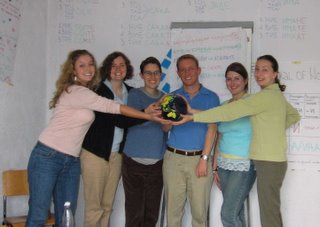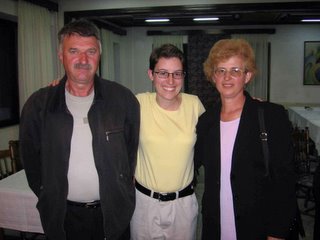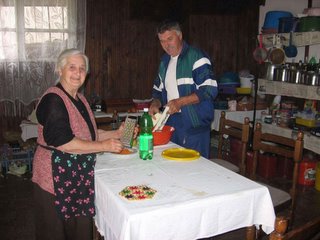


Celebrating Thanksgiving has been a beloved tradition for PC in Macedonia, with a big Thanksgiving dinner for all the staff, current volunteers, trainees and their host families. It was a real festive occasion; there were probably about 200 people in attendance (with about 70 volunteers & trainees currently serving in Macedonia). It was held at a nice restaurant in Veles, all the families and volunteers brought food. Peace Corps provided the turkeys (15 total, shipped over from the US). My host mom made mashed potatoes (purée kompiree), baked tikva (pumpkins) and a kind of cornbread. She wouldn’t allow me to help with the cooking. However, I did help with the decorating and setting up at the restaurant. We took pumpkins from my family’s garden for decoration, as well as dry leaves and flowers.
First our country director got up and said a few words. Then my friend Erika and I gave brief speeches about what Thanksgiving is and the history behind it. Erika gave hers in Albanian and mine was in Macedonian. We both read our speeches that were written with the help from our language teachers. It was the first time that I had heard Albanian spoken, Erika did an amazing job, the language is very melodic, it reminded me a little of French! When I gave my speech, I was nervous, but it went well and I was glad I did it. Then Sara W. (another trainee) gave a short, touching and humorous speech about things we are grateful for, including the hospitality of our host families, the assistance from the PC staff, as well as the support and love from our families and friends back in the US…oh yeah, and letters & packages from them too!
Then the dinner began, which was buffet style. One of the restaurant staff carved the turkeys. There was an incredible amount of food there; the table was packed and the dishes were almost overlapping each other, so there was plenty of food for everyone. Both Macedonian and American food were present (some people got creative with making things like stuffing and apple pie with the ingredients that were available). The only common staple missing were cranberries (not available here). There was also raijka (“rock-eeah”), liquor made from grapes, and plenty of “sok” (sodas).
The program continued after dinner with a group of us trainees leading a rendition of “America, the Beautiful”, and trainees from Negotino giving a short skit of a typical Thanksgiving day in the states (including pie-making and football watching). Then the group from Chaska led the traditional Macedonian dance “The Oro” (which is A LOT like Greek dancing; a little like line dancing, but slower, holding hands, stepping and leg swinging in unison). This was one of my favorite moments of the evening. There were perhaps 150 people, Macedonians and Albanians, Volunteers and Staff, young and old, people of all ages, backgrounds, ethnicities, skin color, languages and gender smiling and laughing over a universal custom: dancing and making merry.
After returning home, I shared the photos and stories with my host grandmother (There was a limited number of people allowed to attend). Then my host brother and two of his friends/cousins arrived. One of them brought out an accordion and the party continued in the small living room with dancing and music! I laughed, danced and, of course, took photographs. Overall, it was a fantastic evening.
This has had to be one of the best Thanksgivings I’ve ever had. The only thing I would’ve changed is to have had my family back home in the US to share it with!



